How To Create Compost Pit
Here we go again, trying to embrace our greener side. Well, actually, our browner side. Yes, we're taking a crack at composting with our very own homemade compost bin.
While we're looking forward to the nutrient-rich and budget-friendly soil amendment that composting provides, our main motivation was actually to reduce our taking-out-the-trash trips. And why send stuff to a landfill when we can use it in our backyard? Some quick research online (thanks treehugger.com) made it clear that there are lots of options when it comes to composting, some of which are very intense and definitely too hardcore for us at this point. So when we found this super simple guide to making our own backyard bin, we wasted no time getting to work. Here are the step-by-step instructions we followed:
Step 1: Select Your Bin
Recycle or buy a plastic bin with a tight fitting lid about 24 inches tall or taller (it needs a lid to keep the soil moist and to keep critters out). We picked up this Rubbermaid version at Lowe's for $7 in hopes that the neutral color would help it blend in with our backyard.
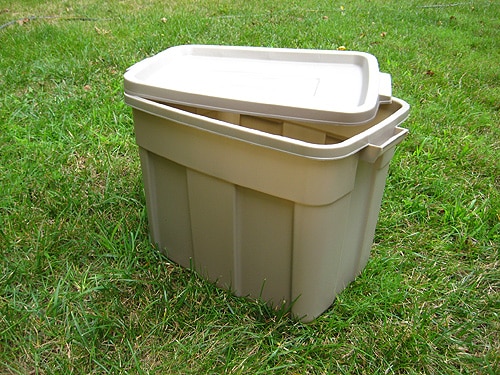
Step 2: Drill Holes In Your Bin
Use a drill to make 8 – 10 small holes in the bottom of the container for aeration purposes.
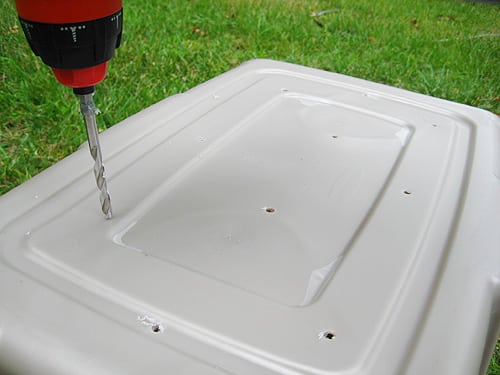
Step 3: Create Your Base
Place some shredded newspaper or dry leaves on the bottom of your compost bin, filling it about 1/8 – 1/4 full. We went the leaves route, since we've got PLENTY of those lying around.
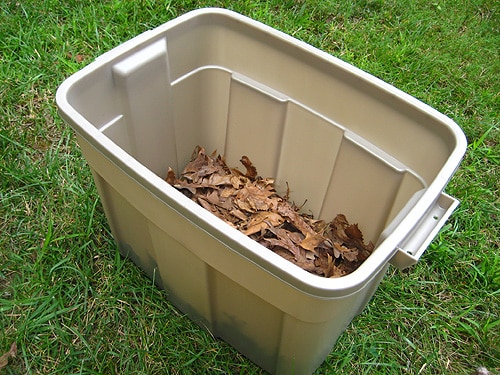
Step 4: Add Dirt
Place dirt on top of the leaves or newspaper until the container is 1/2 full. Again, PLENTY of that.
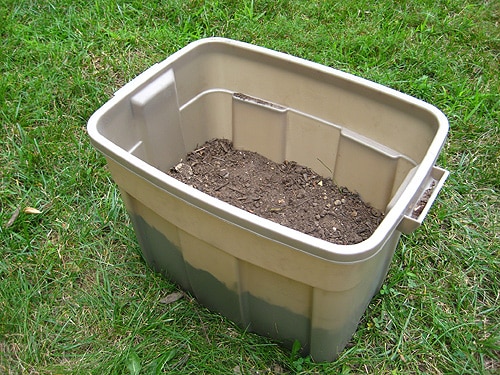
Step 5: Toss In Your Food Scraps!
Now place any food scraps or paper products that you'd like to compost. Check out this list for a pretty complete rundown of what you can and can't compost. Surprisingly, things like lint and eggshells are compost friendly, while lime (too acidic) and dog "waste" (could carry disease) are off-limits. So far we only collected a couple of banana peels and a small ball of lint. Maybe this will encourage us to eat more fruits and veggies? Or do more laundry?
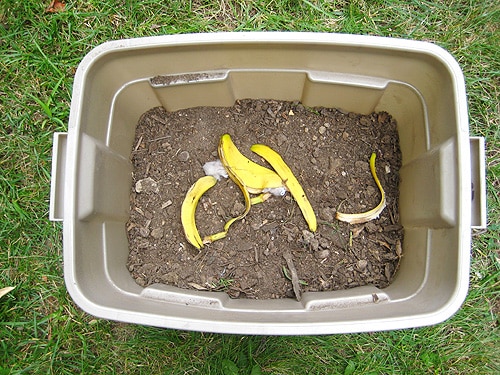
Step 6: Stir Your Compost
Give your compost a little stir (very little, in our case) with a shovel or stick, making sure to cover your food scraps with dirt. Canine supervision is optional.
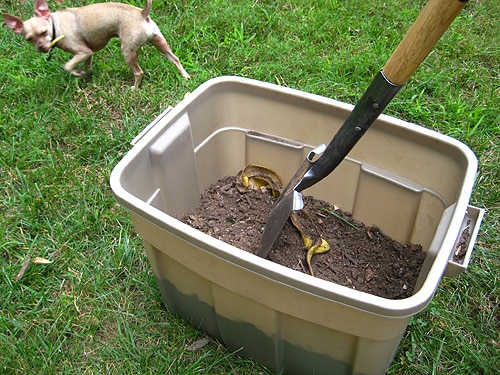
Step 7: Moisten!
Spray with lukewarm water until moist, but not soaking wet. (Note: too much water can be the culprit if your compost starts to smell).
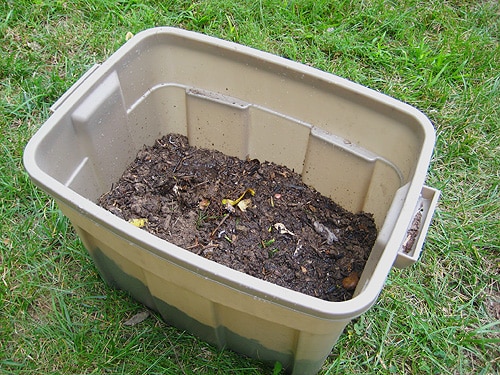
Step 8: Drill Holes In The Top
Use a drill to make 8 – 10 small holes in the lid and place it securely on top of the bin. These will help with air flow.
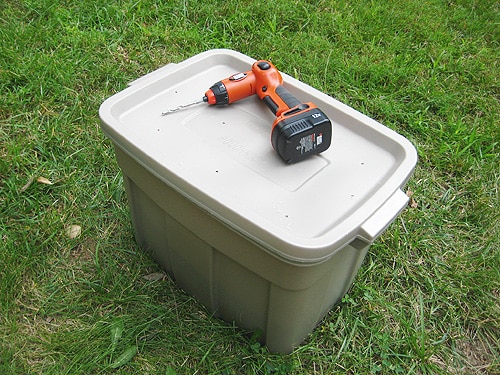
Step 9: Find A Spot For Your Compost Bin
Place the bin in a shady area away from the house (if you live in an apartment or have no backyard you can place your bin on the patio). Be sure that it's not in full sun or your compost will dry out. We found the perfect spot near our garage where our bin can hide behind some shrubs – inconspicuous and convenient (since we take the garbage and recycling out this way already). Can you spot it? HINT: check the bottom right.
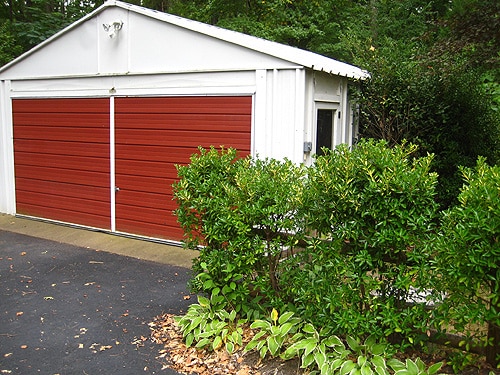
Step 10: Collect Your Compostables!
Now that our compost bin is set up, we can just add food scraps when we've got 'em, making sure to give things a stir each time (mixing the compost helps break everything down faster). And to aid in our collection of stuff to compost, we've added a special "compost" receptacle under the sink (along with our existing recycling and garbage containers). Gotta love a no-fail way to get in the compost habit.
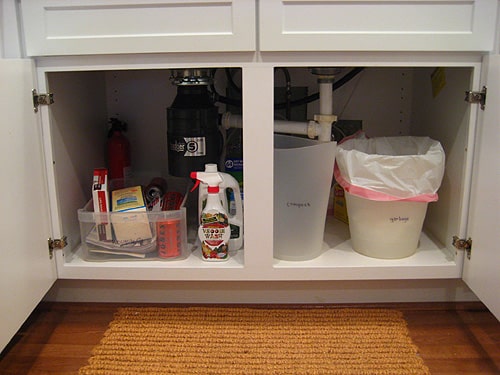
Now we just have to wait 2 – 3 months before the compost is ready for our yard or garden. It can be used as mulch or potting soil and can also be sprinkled over grass as a lawn conditioner. Hopefully we can reap some of the composting rewards in some of our fall planting or lawn overseeding. But we have to remember to save at least 1/3 of it so we can keep the composting process going.
Seems pretty easy, right? And so far the whole thing has cost us less than $10.
Update: We installed a larger compost system in our new house using old shipping palettes. Click here to check out this alternate composting project.

We also shared in this post how we found an airtight container to collect our food scraps inside.

**This post was originally published on August 21, 2008**
PS: Wanna know where we got something in our house or what paint colors we used? Just click on this button:

How To Create Compost Pit
Source: https://www.younghouselove.com/younghouselovedotcompost/
Posted by: henryrocklairling1983.blogspot.com

0 Response to "How To Create Compost Pit"
Post a Comment